The African Fish Eagle is a large eagle that is found near lakes and rivers in Sub-Saharan Africa. It is a big bird with a majestic presence and an iconic piercing call that can be heard in most of Africa's waterways.
Beyond the looks and the iconic "sound of Africa" cry, the African fish Eagle is steeped in Africa's heritage and culture across its wide habitat. From being a symbol of good fortune to being the national bird of several countries, it truly is a symbol of Africa in a way no other bird or animal can compare.
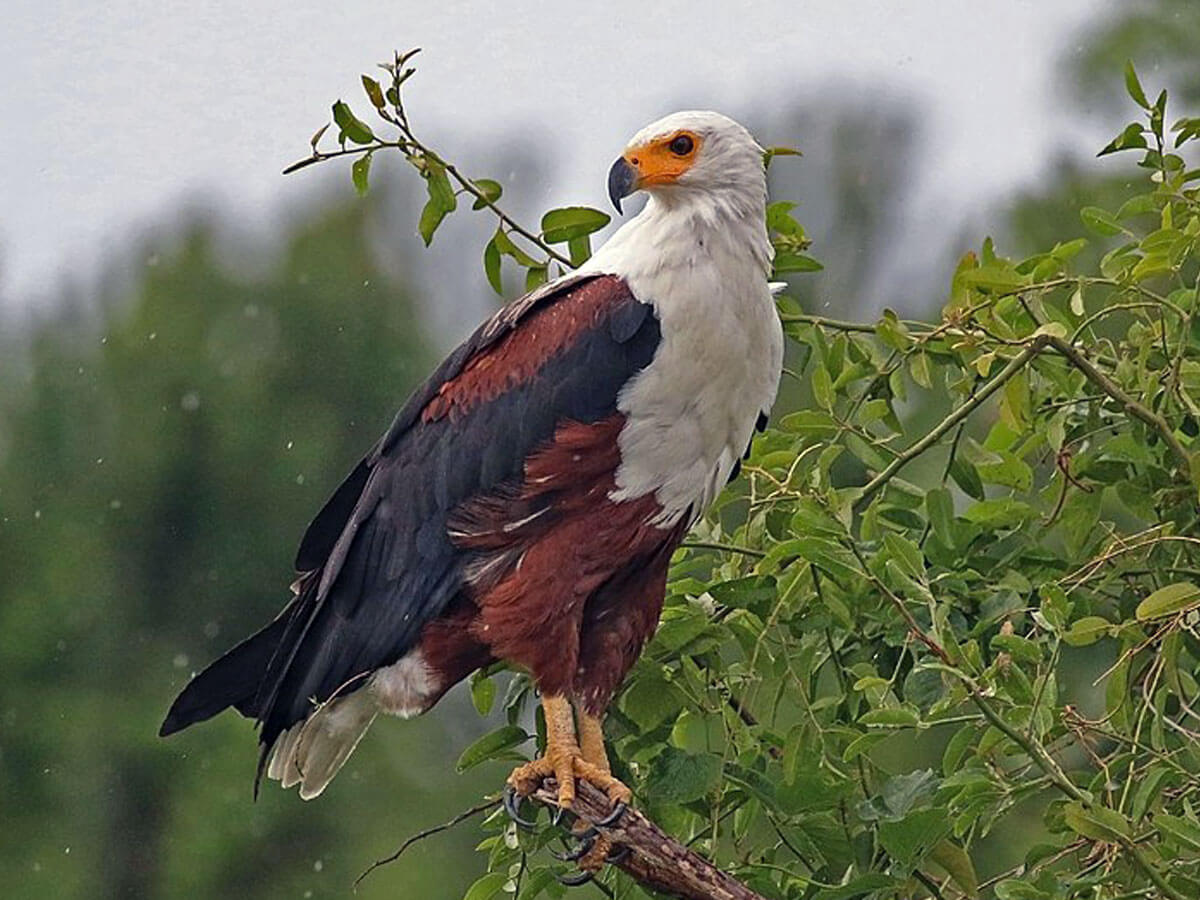
In this article, we'll take a look at all the interesting facts that make the African Fish Eagle one of Africa's most important birds, and why when you get a chance to see it, you should slow down and revel in the special moment.
Facts About The African Fish Eagle
1. Size & Wingspan
The African Fish Eagle is a big bird that can reach up to 2 feet (0.6 meters) in height - with a wingspan of up to 8 feet (2.4 meters). Their body length is around 75 cm (29 inches) and they weigh between 2 kg (4.4 lb) and 3.6 kg (1.9 lb), with females being slightly bigger than the males.
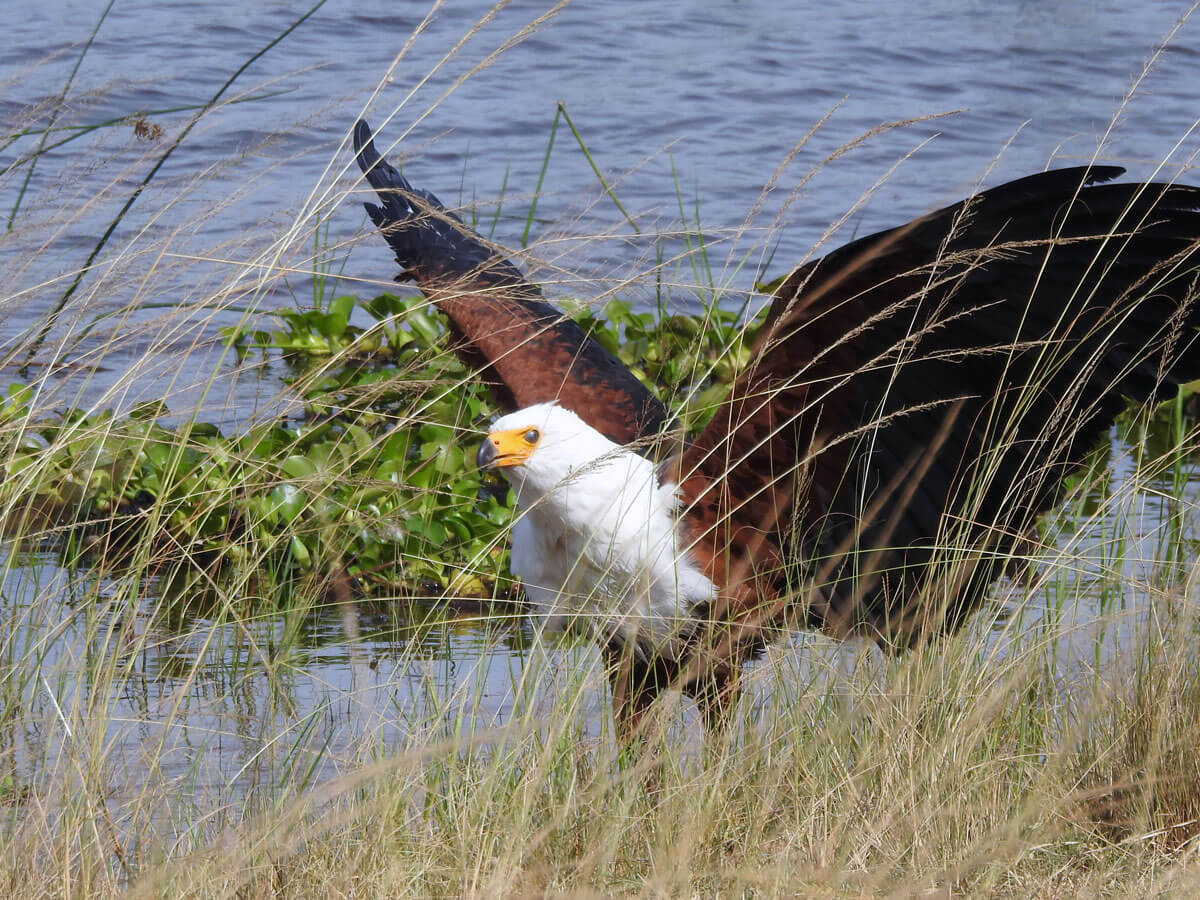
The wide wingspan enables the African fish eagle to easily fly to high altitudes where they can patrol their territory and search for prey - thanks to their incredible eyesight.
2. Habitat - Where to see African Fish Eagles
The African fish eagle lives near waterbodies in many African countries below the Sahara Desert. They can be found around lakes, rivers and sometimes near the coast where they will easily find fish and other prey for food.
From the vast lakes of the Great Rift Valley to meandering rivers in the savannah and coastlines, the African fish Eagle is very adaptable and its distinct vocalisations can be heard in most of Africa.
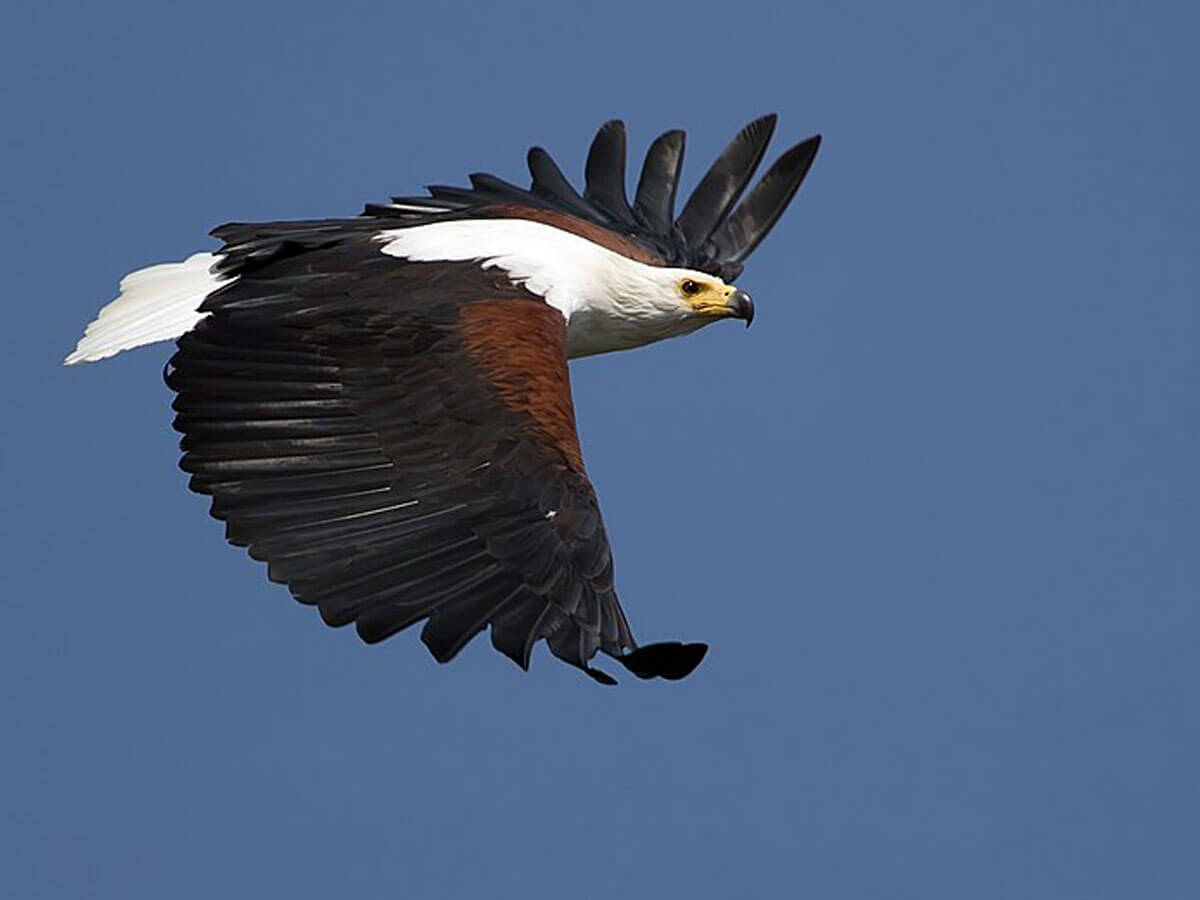
Except for arid areas (deserts) with little surface water, the African fish eagle is found all over Africa. Here are some countries where you will easily find it near the lakes, swamps and rivers.
| Uganda | South Sudan | Kenya |
| Tanzania | Rwanda | Malawi |
| Zambia | Zimbabwe | Mozambique |
| South Africa | Botswana | Namibia |
3. A Special Call
One of the most distinctive features of the African Fish Eagle is its powerful and unforgettable call. Often referred to as "the sound of Africa," their loud, haunting yelps can be heard echoing across the savannas and waterways.
The call has been described as a "yelping laugh" or a "whistling scream" and it serves multiple purposes especially territorial display and communication among mates. The high-pitched yelps carry far and wide, leaving no doubt about the presence of this magnificent bird.
In German, the African Fish Eagle is known as Schreiseadler which translates to screaming eagle because of this distinct call.
Related Article: Africa's 10 most beautiful birds to see and photograph in the wild
4. Diet - What does the African Fish Eagle eat?
As the name suggests, the African fish eagle primarily eats fresh fish that it hunts from its habitat. Utilizing their great eyesight, they can spot prey from a long distance up a tree or in the sky and then fly at high speeds to snatch the fish from just below the surface of the water.
Unlike other fish eagles that plunge under the water, the African fish eagle often snatches its prey from the water or does a shallow dive at most.
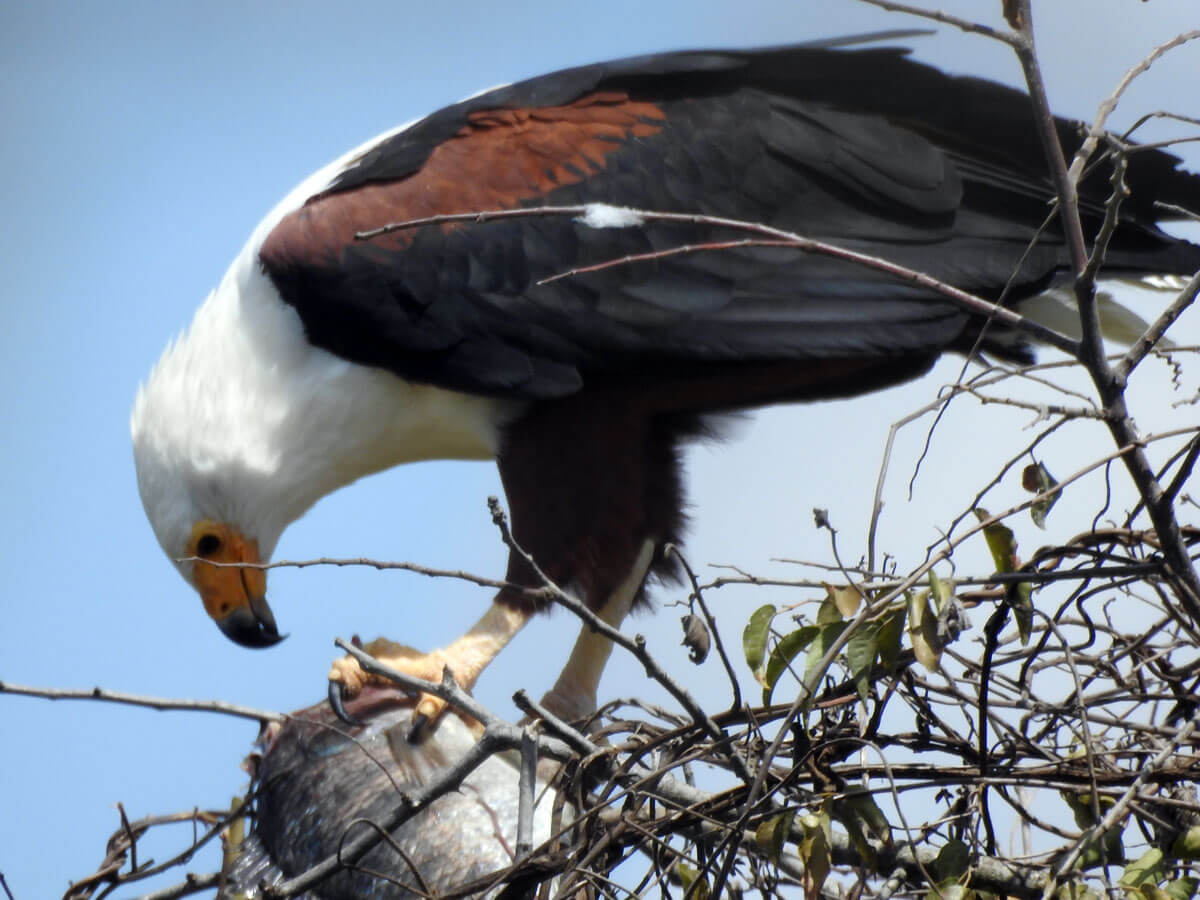
Similar to other sea eagles, the toes of the African fish eagles have sharp barbs (spicules) which in addition to the sharp talons help in firmly grasping even the slippery fish.
Additionally, African fish eagles are not picky eaters and can also hunt other prey such as baby crocodiles, frogs, termites, turtles, hares, rats, monkeys and other bird species. The African fish eagle can also steal prey from other big birds such as pelicans but will also eat the decaying flesh of other animals in the wild.
Being able to hunt with precision and skill, as well as being opportunistic enables the African fish eagle to survive and easily adapt to the various ecosystems and the changes that come with life in the wild.
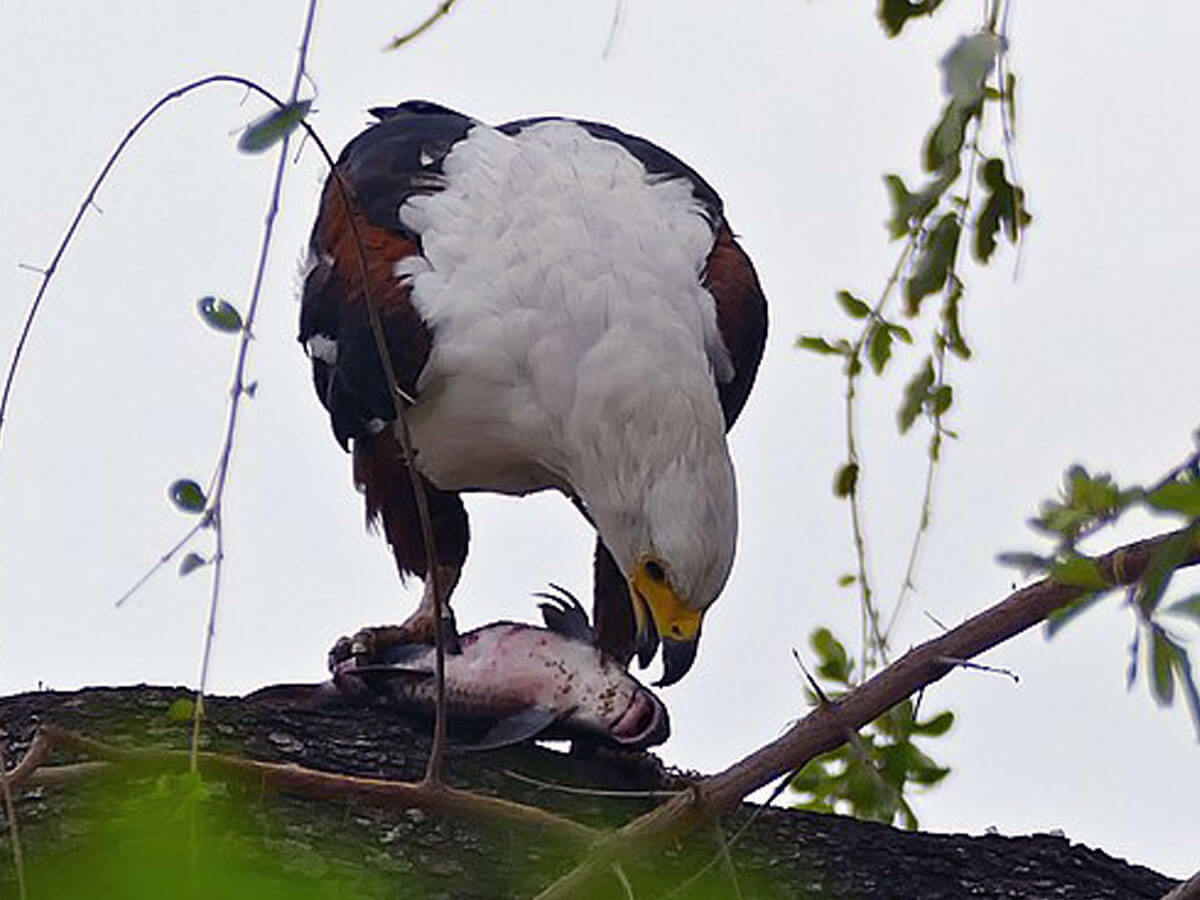
5. Hunting - Powerful talons & superb eyesight
The African Fish Eagle's success as a fish hunter is attributed to a combination of physical adaptations and exceptional eyesight. Their powerful talons, equipped with sharp curved claws, allow them to firmly grasp slippery fish. The strong, hooked beak further aids in capturing and tearing apart their prey.
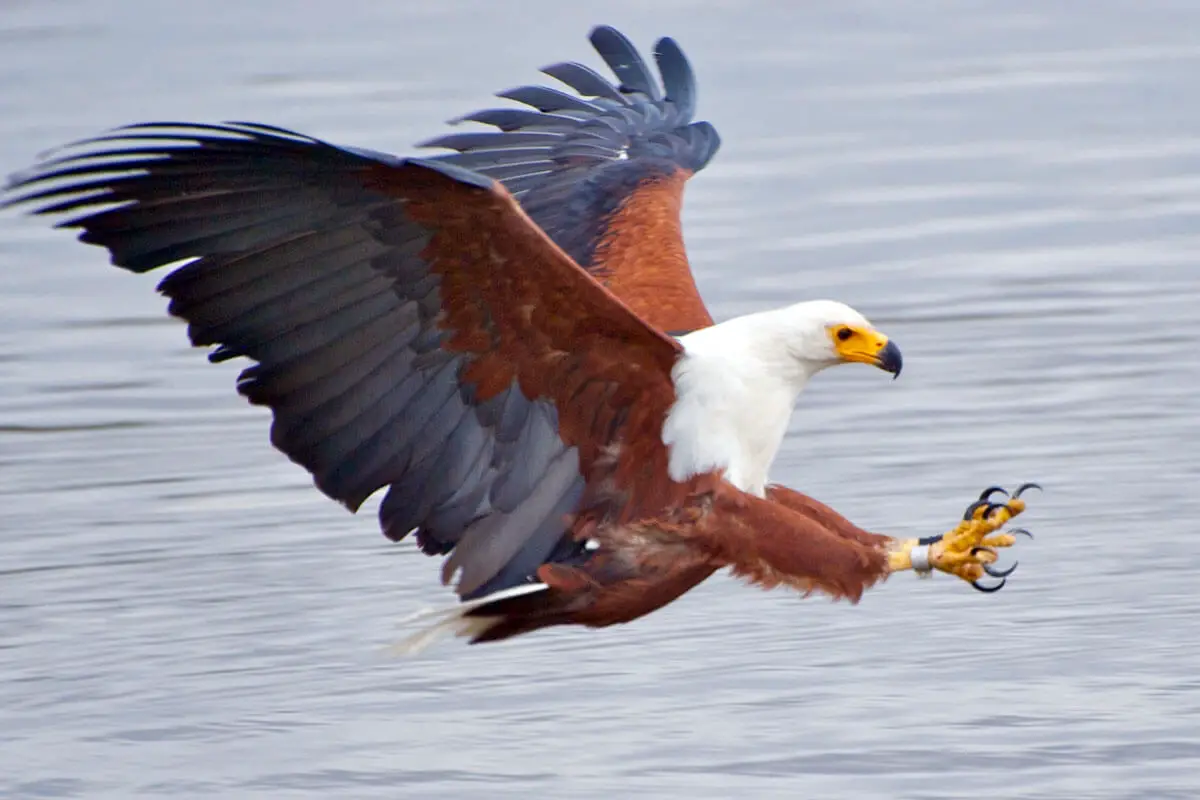
But the most crucial element in their hunting strategy is their remarkable vision. Their eyes are positioned on the front of their head, providing excellent binocular vision. This allows them to perceive depth with exceptional accuracy, crucial for judging distances when diving for fish. Their eyesight is so keen that they can spot fish swimming near the water's surface from incredible distances. This exceptional vision, combined with their agile flight and sharp talons, makes them true specialists in the art of catching fish.
6. Social Life - Lifelong partners & raising the young
Most birds of prey live solitary lives but the African fish Eagles can often be seen in pairs of a small family group comprising of the parents and their 1 or 2 young chicks.
African Fish Eagles form strong pair bonds and tend to remain monogamous for life. As a pair, they work together to hunt, defend their territory and raise their young. They usually perch together on lookout points, their calls echoing across the landscape.
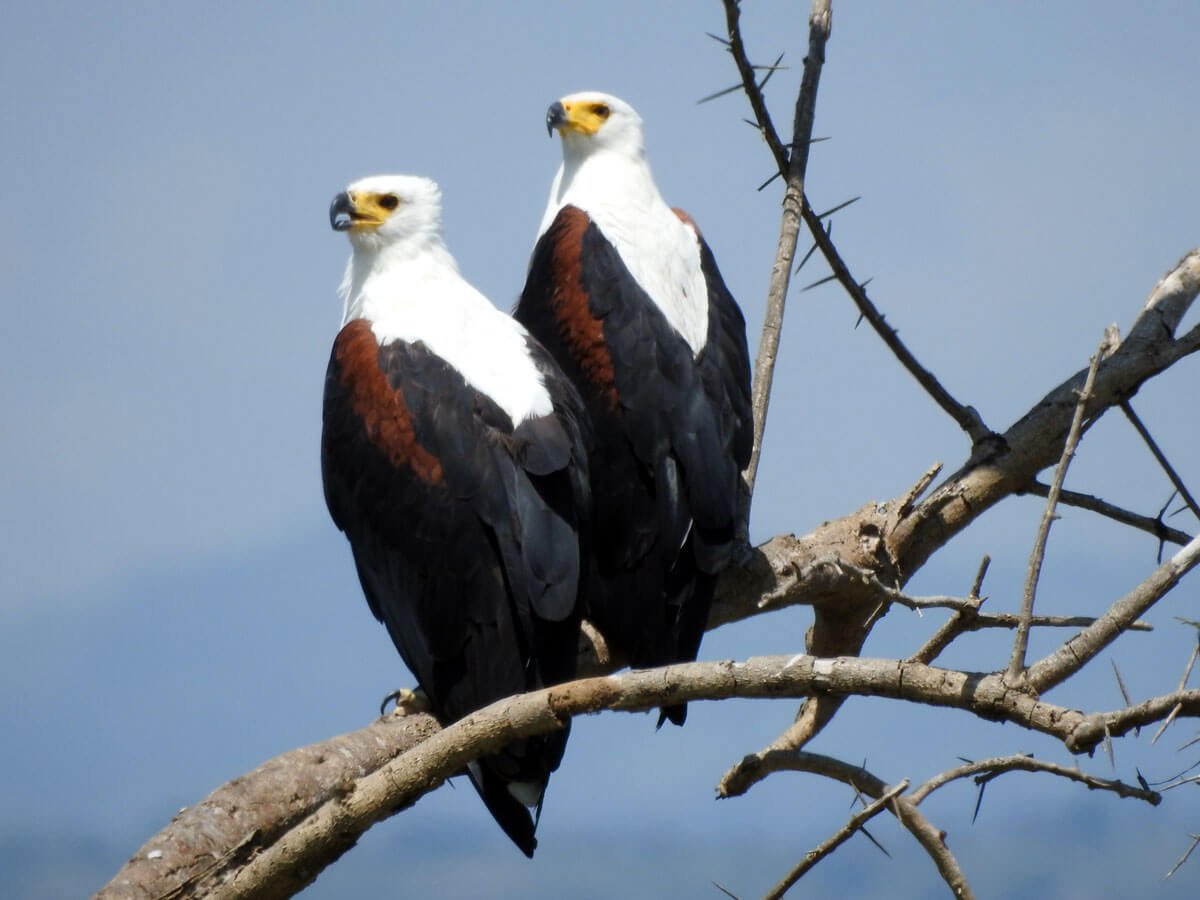
During the dry season, the fish eagles work together to build a huge nest with branches. The nest building continues over the years and can end up as big as 2 meters (6.6 feet) in diameter. It's in this nest that the female lays 1 to 3 eggs which get incubated for around 45 days.
The chicks of the African Fish Eagle do not kill or outcompete each other as is the case for most birds of prey. It is common to see a pair with 2 juvenile offspring.
The hatchlings are cared for and fed by both parents until they are grown and ready to fly. This takes around 75 days but they stay a little longer with their parents until they can go and congregate with other juveniles away from the territories of adults.
7. Lifespan of African Fish Eagles
African Fish Eagles enjoy a long life in the wild and have a life expectancy of 12 to 24 years. Their lifespan is determined by factors such as the degradation of the ecosystem which reduces their food sources and big trees to perch and build nests.
Given that they are opportunistic hunters, they will at times suffer injury - especially in cases when they attempt to hunt or steal bigger prey.
Related article: Comparing the lifespan of African animals in the wild
8. Cultural Significance
The African Fish Eagle is one of the most celebrated in a wide range of Traditional cultures in Sub-Saharan Africa. Generally, it is seen as a symbol of power, strength and purity.
In terms of national significance, the African fish eagle is the national bird of Zimbabwe, Namibia and South Sudan. In Zambia, it appears on the flag and the coat of arms.
Whether it's as a national symbol or as the bringer of good fortune, the African fish eagle is one of Africa's most loved and significant birds.
9. Comparison With Other Big Eagles
At first glance, the African fish eagle can easily be mistaken for other large eagles - especially the Bald Eagle and the Golden Eagle. While they are somehow related and do exhibit some similarities, they are also significantly different.
Compared with the Bald Eagle, the African Fish Eagle is slightly smaller and has a white head, chest and tail. On the other hand, the chest of the Bald Eagle is not white. Another key difference is their habitat, African fish eagles live in Africa, south of the Sahara desert while bald Eagles live in North America.
Another comparison is with the Golden Eagle. While the plumage colours differentiate the two eagles, the golden eagle is a northern hemisphere bird common in North America, Europe, Asia and small parts of Northern Africa. Additionally, the golden eagle likes to stay in the mountains while the African fish eagle prefers the open grasslands near waterbodies.
Beyond the differences that exist between African fish eagles and the bald or golden eagle, they still share the main components of being a big eagle and an apex predator. They are large powerfully built birds with sharp beaks and talons as well as good eyesight and great hunting skills.
10. Threats to African Fish Eagles
There are various threats to the survival of African Fish Eagles such as pollution and habitat destruction. Development projects such as dam construction and conversion of wetlands to agricultural land destroy the habitat for fish which is a major part of the African fish eagle's diet.
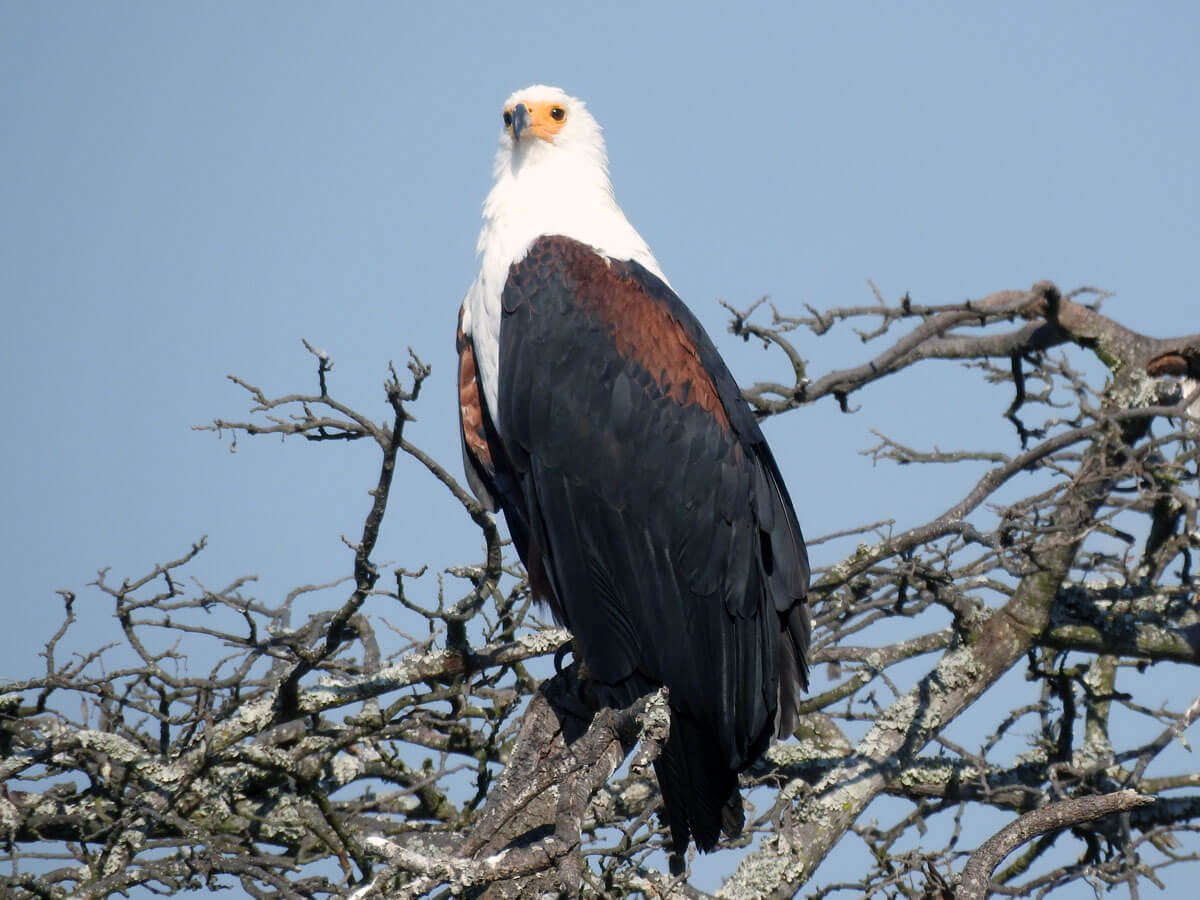
Like other birds of prey, the African fish eagle is an indicator species. Because they need a lot of fresh fish and other small animals, and big trees to nest and perch, their absence is an indicator of the local ecosystem suffering.
11. Conservation Status
According to the International Union for the Conservation of Nature (IUCN), the African Fish Eagle is classified as "Least Concern". This means that the populations are considered quite stable and not facing any immediate threat of extinction.
As big territorial birds, each pair needs a lot of space and having stable populations doesn't mean huge numbers as you would see with flamingos, marabou storks or ostriches that can be found in large groups.
It is estimated that there are around 300,000 African Fish Eagles in the wild.
Conclusion
The African Fish Eagle is more than just a magnificent bird of prey. It is a symbol of Africa's wild beauty and a reminder of the delicate balance of the natural world. Their powerful calls echo across the continent, and their impressive hunting skills, and their lifelong partnerships all contribute to their iconic status.
It is a perfect mix of beauty, skill, adaptation and a critical role in the ecosystem. We hope when you get your chance to see them in the wild, you will slow down and appreciate the moment - not just because of their beauty or hunting, but because if you are where they are, you are in a healthy part of the natural wild - the way it should be.
Whether you are into bird watching, or it is something you don't think would be your thing, the African Fish Eagle is a beauty and an icon worth seeing should you be on safari in any of the countries we mentioned above.
